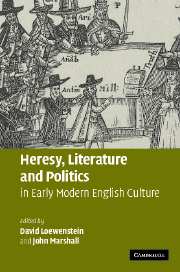Book contents
- Frontmatter
- Contents
- Acknowledgments
- Notes on contributors
- Introduction
- 1 Writing and the persecution of heretics in Henry VIII's England: The Examinations of Anne Askew
- 2 Anabaptism and anti-Anabaptism in the early English Reformation: defining Protestant heresy and orthodoxy during the reign of Edward VI
- 3 “Godlie matrons” and “loose-bodied dames”: heresy and gender in the Family of Love
- 4 Puritanism, Familism, and heresy in early Stuart England: the case of John Etherington revisited
- 5 A ticklish business: defining heresy and orthodoxy in the Puritan revolution
- 6 Thomas Edwards's Gangraena and heresiological traditions
- 7 “And if God was one of us”: Paul Best, John Biddle, and anti-Trinitarian heresy in seventeenth-century England
- 8 The road to George Hill: the heretical dynamic of Winstanley's early prose
- 9 Milton and the heretical priesthood of Christ
- 10 An Historical Narration Concerning Heresie: Thomas Hobbes, Thomas Barlow, and the Restoration debate over “heresy”
- 11 Defining and redefining heresy up to Locke's Letters Concerning Toleration
- 12 “Take heed of being too forward in imposinge on others”: orthodoxy and heresy in the Baxterian tradition
- Index
2 - Anabaptism and anti-Anabaptism in the early English Reformation: defining Protestant heresy and orthodoxy during the reign of Edward VI
Published online by Cambridge University Press: 20 February 2010
- Frontmatter
- Contents
- Acknowledgments
- Notes on contributors
- Introduction
- 1 Writing and the persecution of heretics in Henry VIII's England: The Examinations of Anne Askew
- 2 Anabaptism and anti-Anabaptism in the early English Reformation: defining Protestant heresy and orthodoxy during the reign of Edward VI
- 3 “Godlie matrons” and “loose-bodied dames”: heresy and gender in the Family of Love
- 4 Puritanism, Familism, and heresy in early Stuart England: the case of John Etherington revisited
- 5 A ticklish business: defining heresy and orthodoxy in the Puritan revolution
- 6 Thomas Edwards's Gangraena and heresiological traditions
- 7 “And if God was one of us”: Paul Best, John Biddle, and anti-Trinitarian heresy in seventeenth-century England
- 8 The road to George Hill: the heretical dynamic of Winstanley's early prose
- 9 Milton and the heretical priesthood of Christ
- 10 An Historical Narration Concerning Heresie: Thomas Hobbes, Thomas Barlow, and the Restoration debate over “heresy”
- 11 Defining and redefining heresy up to Locke's Letters Concerning Toleration
- 12 “Take heed of being too forward in imposinge on others”: orthodoxy and heresy in the Baxterian tradition
- Index
Summary
In the opening passages of a sermon preached before Edward VI on March 29, 1549, Hugh Latimer expounded the parable of the wicked judge (Luke 18). According to Latimer, this story taught that “it was good and lawful for honest, virtuous folk, for God's people, to use the laws of the realm as an ordinary help against their adversaries, and ought to take them as God's holy ordinances.” He then proceeded to warn his audience about “a certain sect of heretics that speak against this order and doctrine; they will have no magistrates nor judges on the earth.” Before returning to the main topic of the sermon, the importance of godly judges and magistrates, he explained a little more about these heretics:
I heard of late, by the relation of a credible person … of a town in this realm of England, that hath above five hundred heretics of this erroneous opinion in it … Oh, so busy the devil is now to hinder the word coming out and to slander the gospel! A sure argument, and an evident demonstration, that the light of God's word is abroad, and that this is a true doctrine that we are taught now; else he would not roar and stir about as he doth. When that he hath the upper hand, he will keep his possession quietly, as he did in the popish days … If he reigned now in open religion, in open doctrine, as he did then, he would not stir up erroneous opinions.
- Type
- Chapter
- Information
- Publisher: Cambridge University PressPrint publication year: 2006

